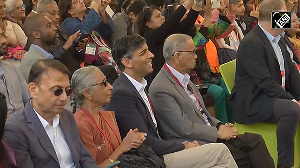After a successful youthful outing with Siva Manasula Sakthi (SMS), Vikatan Talkies is back with Valmiki; a tale, they say, is about a pickpocket who re-examines his life after society turns its back on him. The Tamil movie has already been creating waves for the simple reason that music maestro Ilaiyaraja, who's composed the musical score surprised his audience with an emotional outburst that caught many celebrities off-guard, at the music launch.
Controversies apart, let's see what this album, with lyrics penned by Vaali, has to offer:
Kooda Varuviya begins with a slow and soothing rhythm, enlivened by a flute segment that augurs well for Bela Shinde's soft voice. Come the charanam, the tune seems to meander, losing some of its spontaneity. It is mildly appealing but the magic seems to be missing. The instrumental interlude before the second charanam is trademark Ilaiyaraja, a slice of many of his chartbusters in the 90s and Bela's voice takes you to pleasing heights, as she traverses the landscape of mildly romantic lyrics. Vaali's words are not specially scintillating: just adequate.
Until Reeta's voice begins a confident Poo Sirikkuthu, the next number baffles you, as it breezes past you with shades of 80s disco music; you can almost see the strobes of light glinting off the dance floor. The harmonium makes an appealing entry, along with the flute of course, taking you right back to the days of Karakattakaaran. The song takes on a rustic feel in the charanam and is a pleasant listen, despite treading familiar territory, perhaps because of the mild tones of anguish lacing the song. The lyrics are unassuming and uncomplicated.
A chorus of children recite Bharathiyar's immortal words, commencing Oli Tharum Sooriyanum, which quickly transitions into the gentle notes of a piano, and then synthesized music. Bela Shinde and Ilaiyaraja themselves have rendered this rather anguish-laced number which speaks of hope, doubt and love all at once. Its here, after quite some time, that you see the maestro's unique touch; the blend of vocals and medley of instrumental music has a simple appeal. A pleasant number.
Classical notes from a nadaswaram kick off Rekkai Katti Parakkuthu, morphing into the rousing beats of a folksy number, and the opening kuthu lines, sung in a suitably hoarse voice, teeth gnashing, by Tippu and Rahul Nambiar, leave you in no doubt of that. Meant, obviously, as a nod to the front-benchers.
Inky Pinky Ponky, chants a child, backed with a chorus, as Shreya Ghoshal sings Thenralum Maruthu, which has a rather neat violin interlude, and the general feel echoes Raja's numerous numbers from the nineties. The lyrics, thankfully, are more about winning life and not giving into despair, a definite respite from mandatory romantic numbers. That's perhaps the biggest plus of this number.
Ilaiyaraja sings Achadicha Kasu, a rather happy-go-lucky song which is all about the protagonist's adventures as a pickpocket; the words are peppy and bring a genuine smile to your face at the insouciant jibes and justifications to make away with someone else's money. The tune is no great shakes with random kiddie-whistles blowing except for a sudden instrumental interlude right at the end, which grabs your attention.
An incredibly hoarse and old voice begins Ennada Pandi and its Ilaiyaraja after all, singing in a delightfully off-key voice about all the travails of a social outcast who's tackling life the wrong way. Accompanied by an intriguing background score, this one scores simply because of its unpredictability and a rough charm that cannot fail to draw you in. Quite an appealing number.
The maestro has turned out so many extraordinary albums over the decades that he has a veritable treasure-trove of tunes to fall back on. No one can deny the composer's flair for orchestration, but barring one or two exceptions, Valmiki's numbers show an inclination to fall into a rut. Hopefully, the picturisation will work in favour of the songs.
Rediff Rating: 






 © 2025
© 2025